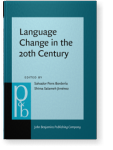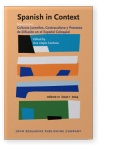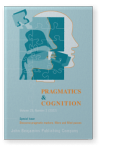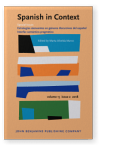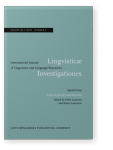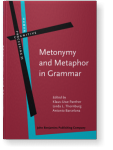Wiltrud Mihatsch
List of John Benjamins publications for which Wiltrud Mihatsch plays a role.
2024 Chapter 4. Diatopic variation as evidence for diachronic changes in the 20th and 21st centuries: The pragmatic markers tipo , onda and como Language Change in the 20th Century: Exploring micro-diachronic evolutions in Romance languages, Pons Bordería, Salvador and Shima Salameh Jiménez (eds.), pp. 120–157 | Chapter
In Latin American varieties of Spanish there is a series of pragmatic markers that fulfil similar functions. Tipo, onda and como are mitigators, but they also express approximation, exemplification, focalisation, discourse structuring and quotation. Pragmatic functions arise in the 20th century,… read more
2024 Culturas juveniles como catalizador de la pragmaticalización de los marcadores tipo y onda en Argentina y México: Un estudio basado en comentarios metalingüísticos Culturas Juveniles, Contracultura y Procesos de Difusión en el Español Coloquial, Llopis Cardona, Ana (ed.), pp. 132–158 | Article
En distintas variedades latinoamericanas del español existe una serie de marcadores pragmáticos propios de la oralidad coloquial que cumplen funciones similares. Los marcadores tipo y onda son atenuadores, pero también tienen un valor de aproximación, ejemplificación, focalización,… read more
2022 Between placeholder and filler: Degrees of prosodic prominence of French machin and truc Discourse-pragmatic markers, fillers and filled pauses: Pragmatic, cognitive, multimodal and sociolinguistic perspectives, Beeching, Kate, Grant Howie, Minna Kirjavainen and Anna Piasecki (eds.), pp. 297–323 | Article
French truc and machin (‘thing’) can function as placeholders, fillers or in general extender constructions. The aim of our paper is to investigate whether the prosodic characteristics of these three different uses may give a clue as to their respective status. For our analysis, we extracted 112… read more
2021 Chapter 14. French type-noun constructions based on genre: From the creation of ad hoc categories to ad hoc categorization Building Categories in Interaction: Linguistic resources at work, Mauri, Caterina, Ilaria Fiorentini and Eugenio Goria (eds.), pp. 373–414 | Chapter
Colloquial French genre is highly polysemous with a variety of functions such as comparison, approximation and the fully pragmaticalized functions as a mitigator, a quotative marker, an exemplifier, a marker of narrative progression, explanation and focussing. So far, the focus has been on the… read more
2018 De la escritura científica a la conversación coloquial adolescente: El caso de tipo Estrategias atenuantes en géneros discursivos del español: Interfaz semántico-pragmática, Albelda Marco, Marta (ed.), pp. 281–304 | Article
Tipo, al igual que sus cognados en otras lenguas, se origina como un latinismo de raíz griega que cobra impulso en las postrimerías del siglo XIX, especialmente en los escritos científicos y académicos, y desempeña un papel importante en los procesos de clasificación y sistematización. Un siglo… read more
2016 Collectives, object mass nouns and individual count nouns: Nouns between lexical and inflectional plural marking Lexical plurals and beyond, Lauwers, Peter and Marie Lammert (eds.), pp. 289–308 | Article
Mass superordinates such as clothing, clothes and furniture form a distinct and peculiar class of nouns in languages with an obligatory singular/plural distinction. These nouns often have pluralia-tantum variants as well as count equivalents – both within one linguistic system as well as… read more
2009 Nouns are THINGS: Evidence for a grammatical metaphor? Metonymy and Metaphor in Grammar, Panther, Klaus-Uwe, Linda L. Thornburg and Antonio Barcelona (eds.), pp. 75–97 | Article
2007 The construction of vagueness: “Sort-of“ expressions in Romance languages Aspects of Meaning Construction, Radden, Günter, Klaus-Michael Köpcke, Thomas Berg and Peter Siemund (eds.), pp. 225–245 | Article
The aim of this contribution is to study the stages involved in the emergence of Romance (and some Germanic) approximators such as French espèce de or genre de based on taxonomic nouns such as French genre ‘genus’ and espèce ‘species’ and to demonstrate which implicatures trigger the emergence of… read more
